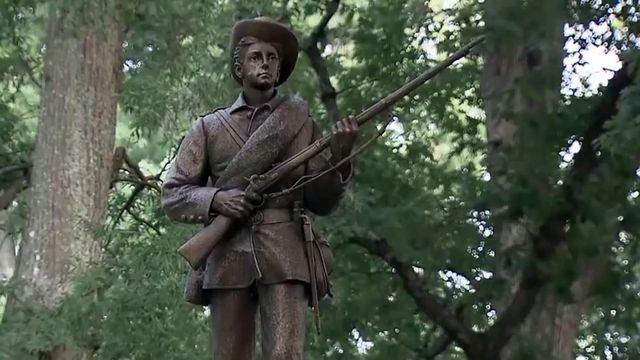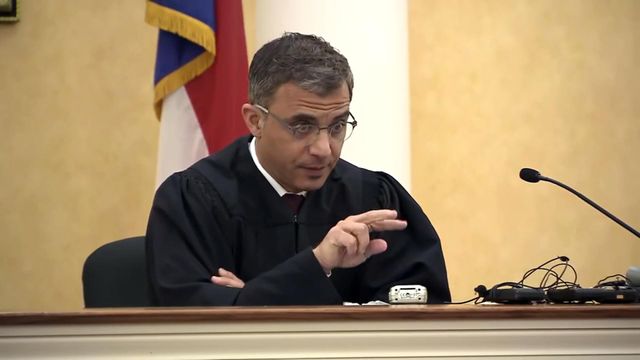Judge throws out 'Silent Sam' deal
A judge on Wednesday threw out a $2.5 million deal to give the controversial "Silent Sam" monument to the Sons of Confederate Veterans, saying the group had no legal right to negotiate the deal with the University of North Carolina system.
Posted — UpdatedIt's unclear what happens now with Silent Sam, which stood on the UNC-Chapel Hill campus for more than a century before protesters pulled it down in August 2018. The statue had been in storage from the time of the protest until the UNC Board of Governors reached a deal with the SCV on the day before Thanksgiving.
Superior Court Judge Allen Baddour gave the Board of Governors until next Monday to figure out what they want to do with the statue. If they don't respond, he said he might hold another hearing on that issue.
Attorneys for UNC have said undoing the deal would require the university system to put the statue back on the Chapel Hill campus, but opponents said they would fight that move, calling it a public safety hazard.
"My hope is that the statue will go back in the custody of UNC for the purpose to destroy it," student De’Ivyion Drew said.
"A lot of UNC students feel as though Silent Sam is not representative of our beliefs, nor is it representative of our student body, especially students of color and marginalized people," student Shareen ElNaga said. "It’s just not a symbol that we want on our campus."
"I think that what matters more is our personal safety and the message we’re trying to send out to students as well," student Fouad Abuhijleh said. "It’s up to the university to find a solution that represents our wants and needs."
Under the deal Baddour approved in November – it settled a lawsuit filed minutes earlier – the SCV would take Silent Sam off UNC-Chapel Hill's hands, and the university would set up a $2.5 million trust to help pay for a facility where the monument would be preserved. The facility couldn't be in any of the 14 North Carolina counties where a UNC system campus is located.
The SCV argued that it purchased Silent Sam from the United Daughters of the Confederacy, which called in the early 1900s for erecting a monument to honor UNC-Chapel Hill alumni who had fought for Confederacy and died in the Civil War and later provided some money for it.
There was no word Wednesday on the status of that agreement after the $2.5 million deal was voided.
"UNC still paid out $75,000 to the Sons of Confederate Veterans, and people need to be held accountable for this shady deal," graduate student Lindsay Ayling said.
Elizabeth Haddix, an attorney for UNC-Chapel Hill students and faculty, argued Wednesday the the UDC never owned Silent Sam – it was prohibited by law a century ago from owning property and entering contracts – so it couldn't transfer any ownership rights to the SCV.
Haddix and Burton Craige, an attorney for UNC-Chapel Hill alumni, challenged the "false facts" that the SCV and the Board of Governors put forward to devise the lawsuit and quick settlement.
"We understand and share the desire to resolve this divisive problem, but the solution cannot come from a fictitious lawsuit or from a plan ... hatched in secret by a group of five members of the Board of Governors," Craige said. "Instead, a solution can only come from an open and respectful dialog that includes UNC trustees, students, faculty, administrators and alumni."
But Sturges and Ripley Rand, an attorney who helped the Board of Governors negotiate the Silent Sam deal, said the SCV had a "colorable argument" that the group owned the statue and had the legal standing to negotiate a settlement with UNC.
"The ultimate answer to the questions about the legal nature of the ownership of the monument ... is whatever two judges at the Court of Appeals or four justices at the Supreme Court would say about it two or three years from now," Rand said. "The Board of Governors could have litigated this case over a number of years in an effort to get that kind of answer. Maybe they would have gotten that kind of answer, and maybe they would not have."
UNC leaders were adamant that Silent Sam not return to the Chapel Hill campus because that would only lead to more protests and possible violence between statue supporters and opponents, Rand said. A 2015 state law restricting the movement of Confederate statues on public property, left the UNC system with little choice but to craft a deal to have a private owner take the statue, he said.
Sturges called allowing a "sideways attack" on the deal bad public policy, saying it would preclude the UNC system from ever negotiating settlements again for fear they could be upended later.
"We effectuated a goal for each party," he said of the settlement. "The statue is no longer on the UNC campus."
At one point in the hearing, Baddour appeared to want no part of the dispute, asking whether UNC and the SCV could enter a private contract regarding Silent Sam without any court involvement.
But Haddix said handing state property and money over to a private group without a court order would violate the state constitution.
Baddour's ruling also dissolves the $2.5 million trust set up for Silent Sam's preservation. There was no immediate word on when that money would be returned to UNC. Sturges noted that he has already been paid $52,000 from the trust, which irked the deal's opponents.
"It should not be the public's expense to pay for the attorneys of the Sons of Confederate Veterans or anyone else," Haddix said, asking that Sturges refund that money.
• Credits
Copyright 2024 by Capitol Broadcasting Company. All rights reserved. This material may not be published, broadcast, rewritten or redistributed.






